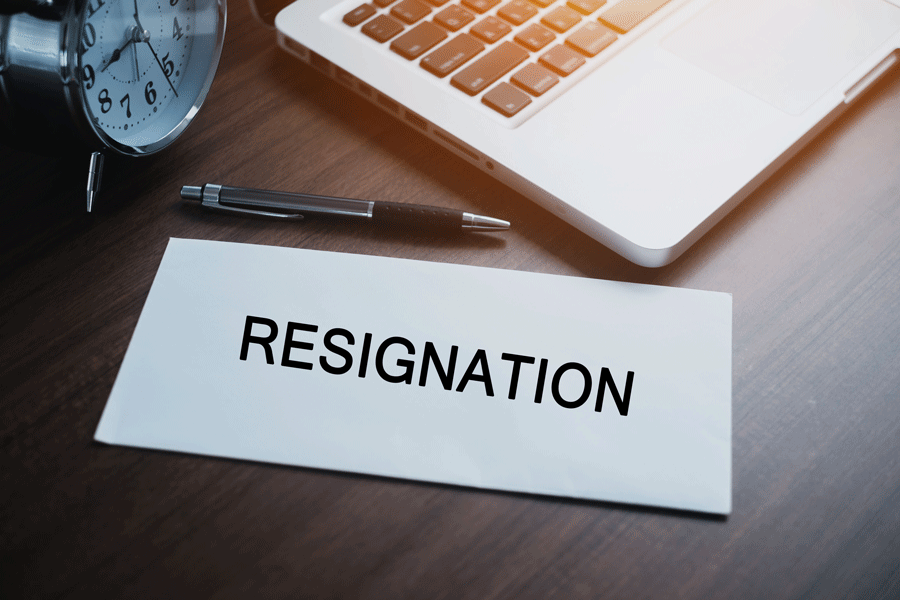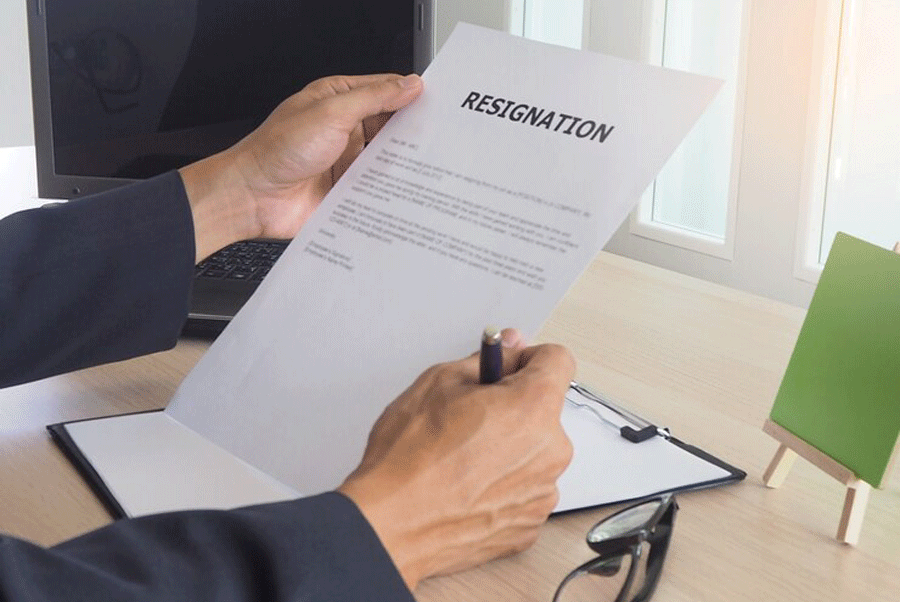After many years of working, you may finally decide that it is time to take it easy and retire. However, before you finally take this step, you should write a letter of resignation to your employer. A sample letter of retirement can help you write a proper letter of retirement.
What is a Retirement Letter?
A retirement letter informs an employer of your intention to retire sometime soon. It is similar to writing a letter of resignation, which is a letter that lets the employer know that you plan to quit your job.
However, there is a difference between the two. Not only is the retirement notice used to inform the company of your plan to leave them and stop working, but also to seek your retirement benefits.
This letter is a courtesy communication letting your employer know that you intend to retire on good terms with the company as most employees wish to do. It is usually done simultaneously with a verbal notice to your manager. You might need to arrange a meeting with your immediate supervisors and other important parties to discuss your plans before submitting the letter, depending on the position.
The letter will state the date you intend to formally retire and any details covered in the earlier meeting. This letter, along with your job contract and any relevant performance reviews, will go into your employee file once management receives it.
Free Retirement Letter Templates
Writing a retirement letter does not have to take a lot of time. It is possible to write one easily if you have already talked to your supervisor about retirement. You can use the guides below or choose a pre-made template that is easy to customize to suit your needs.
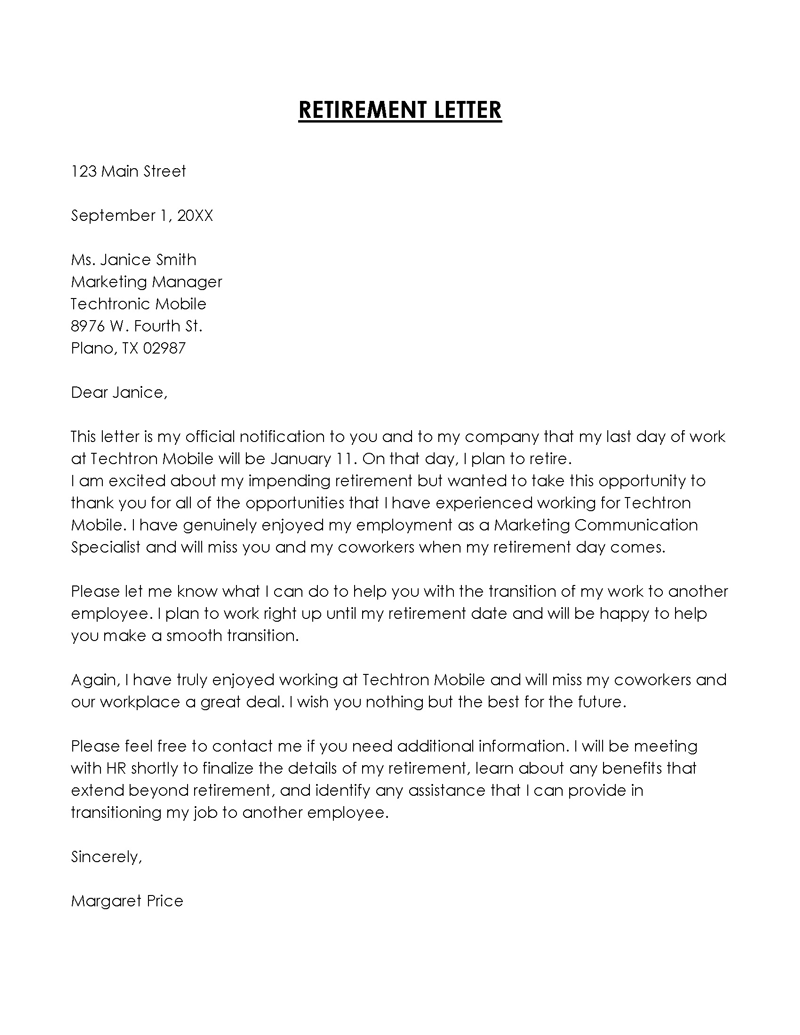
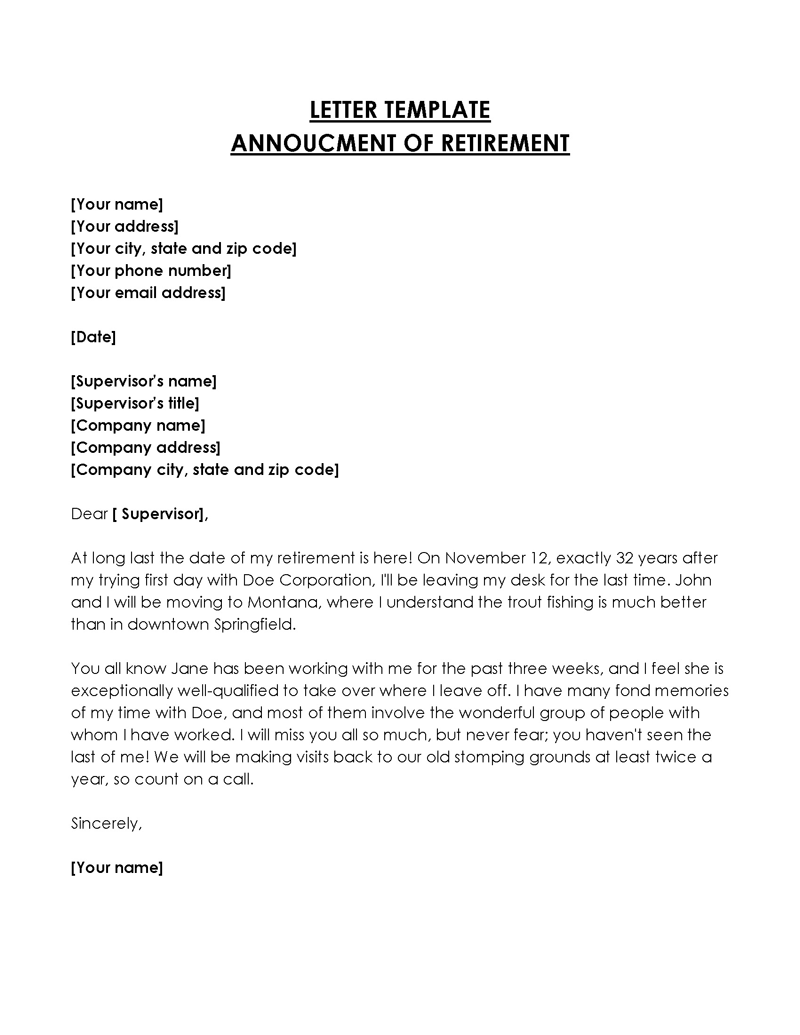
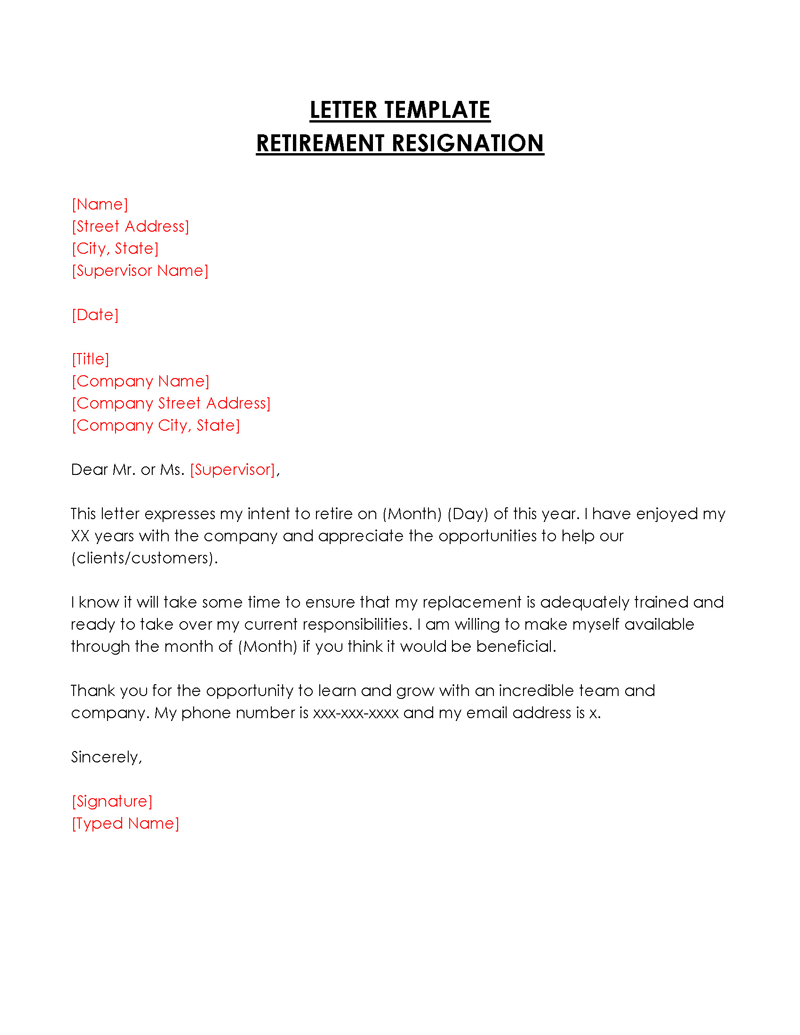
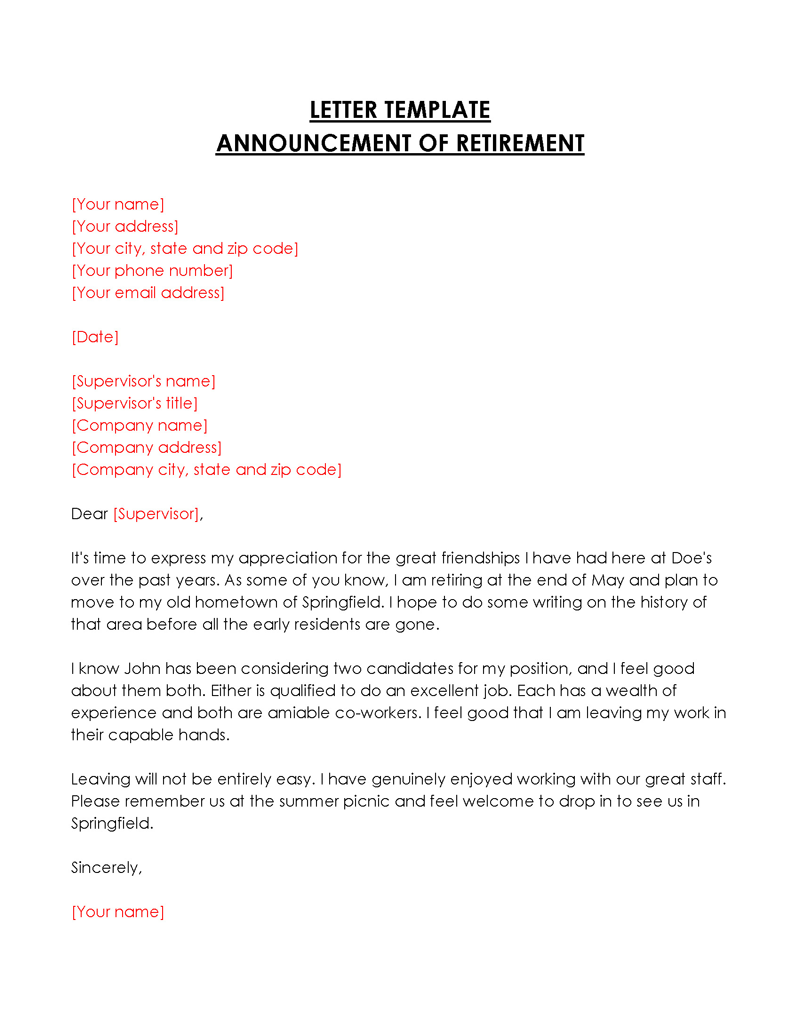
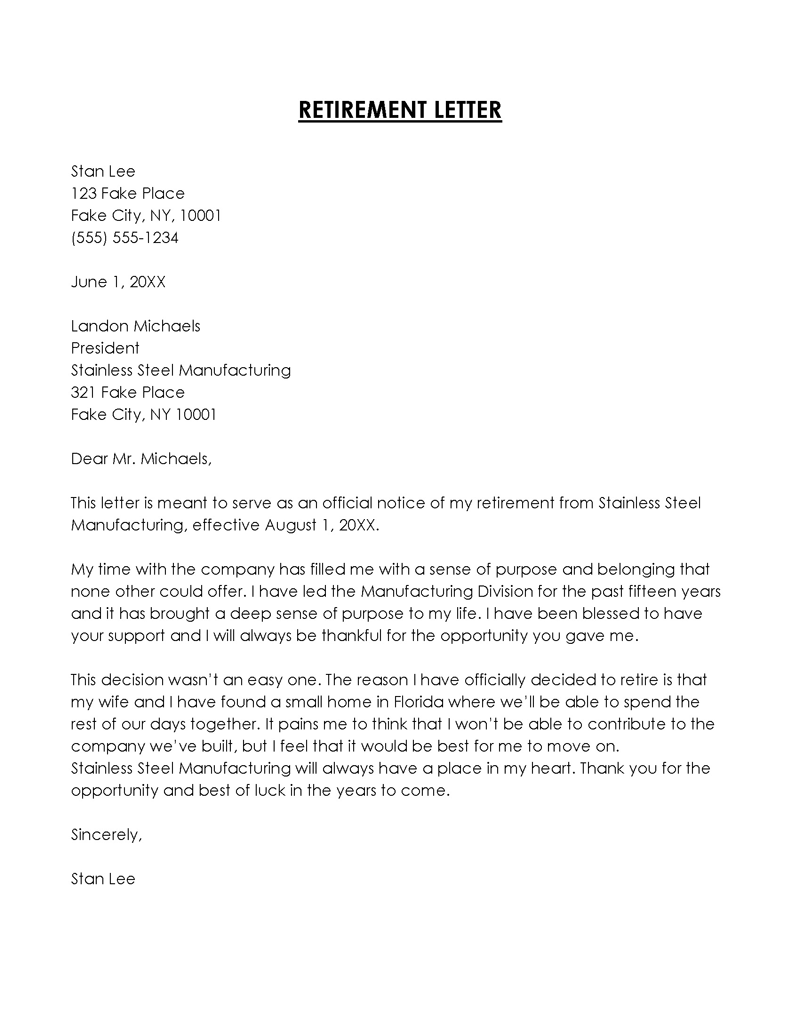
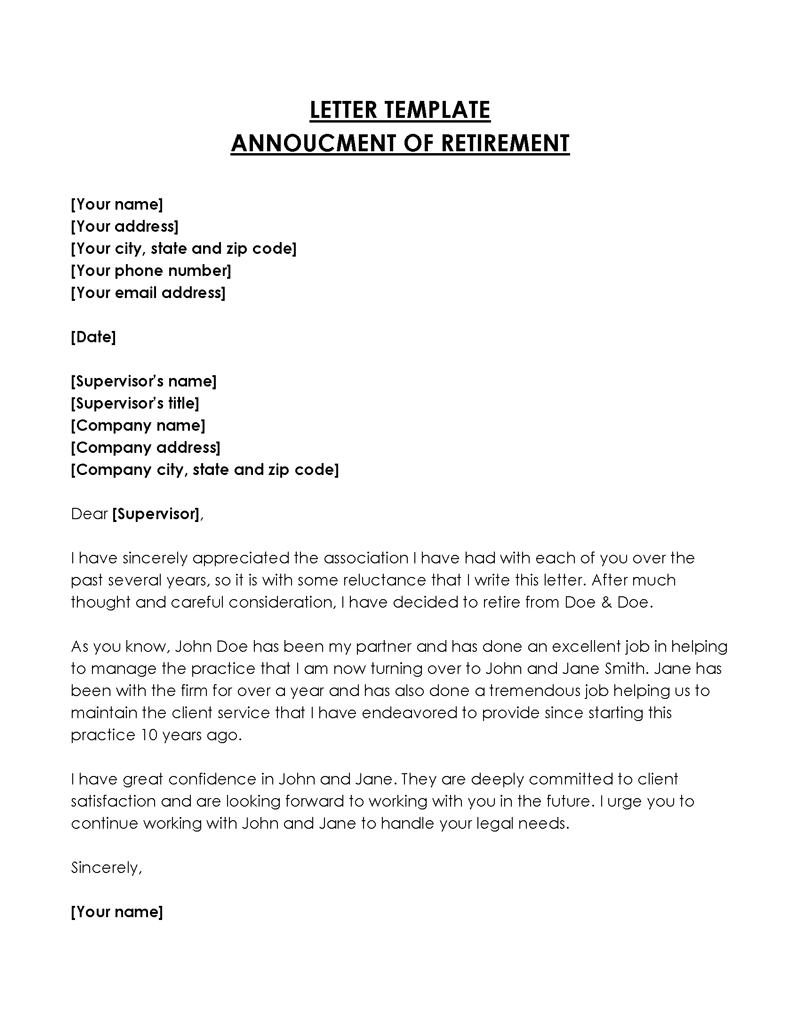
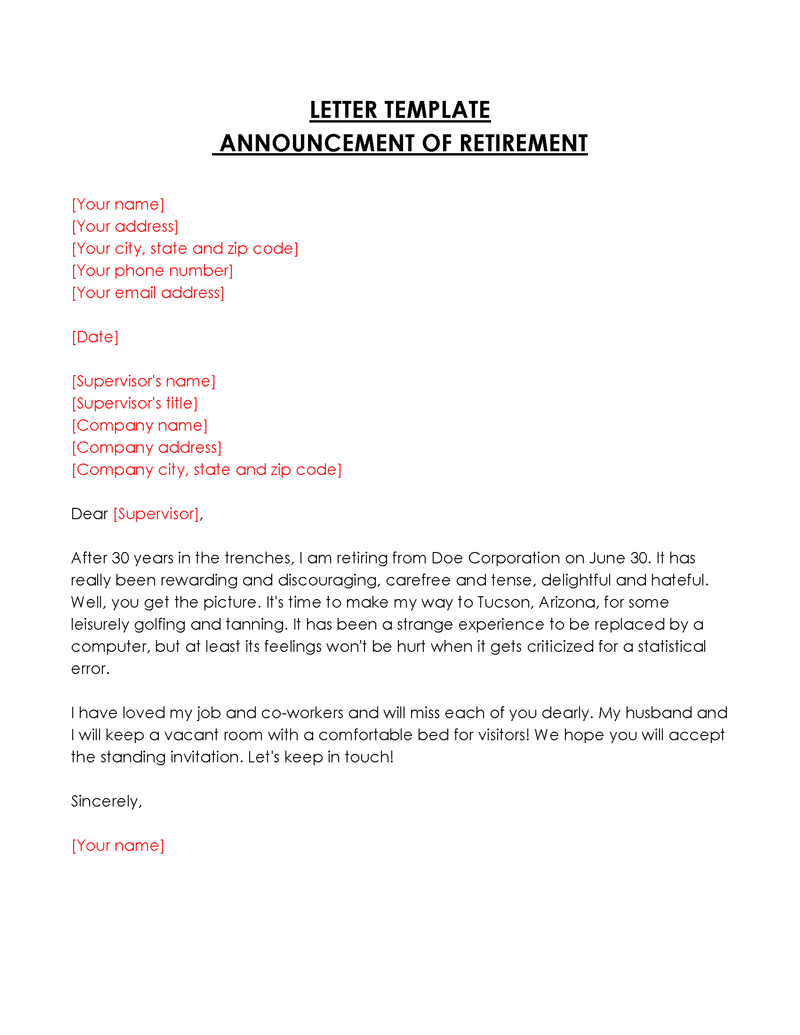
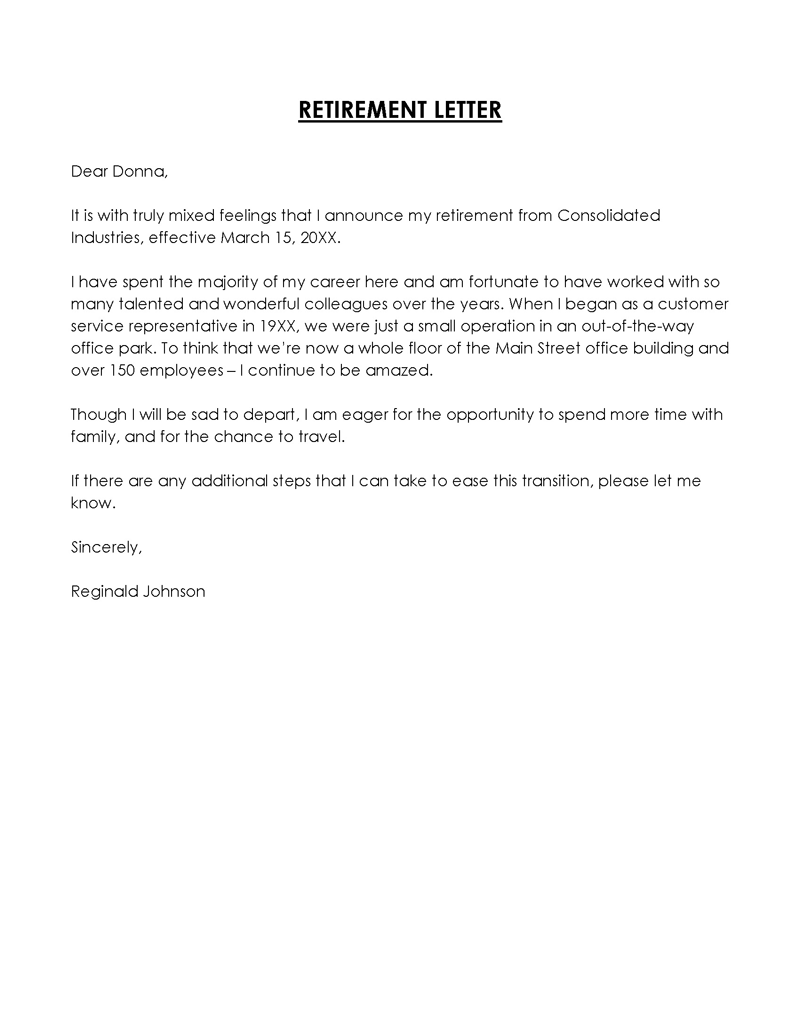
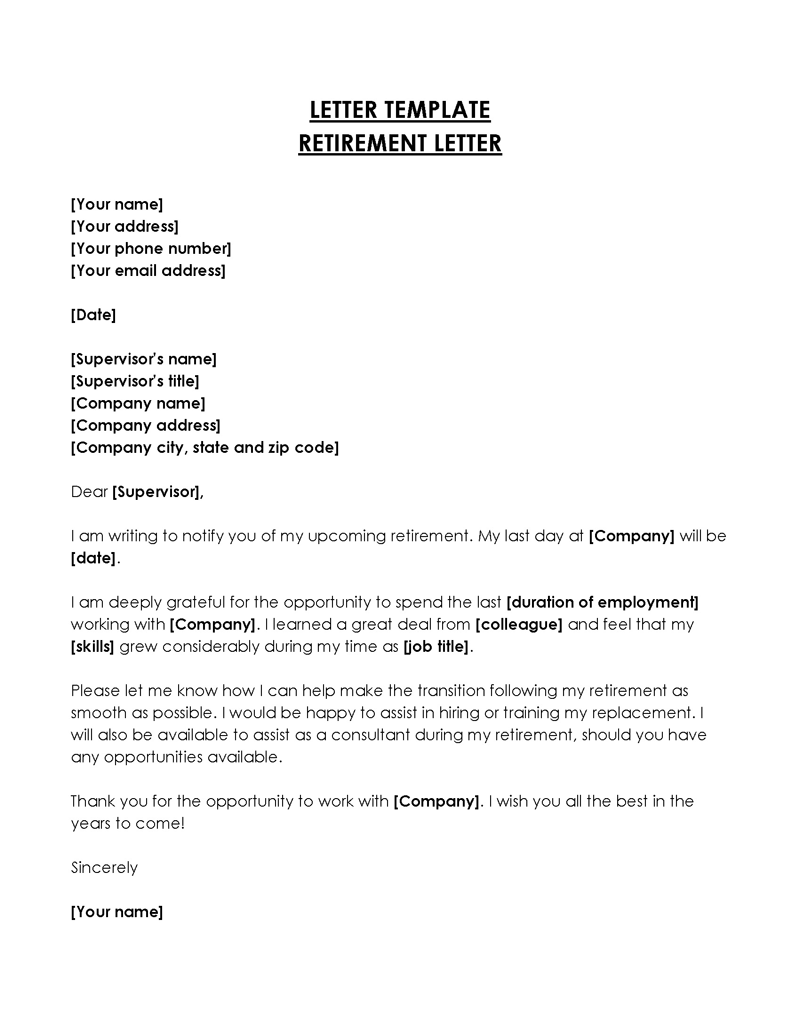
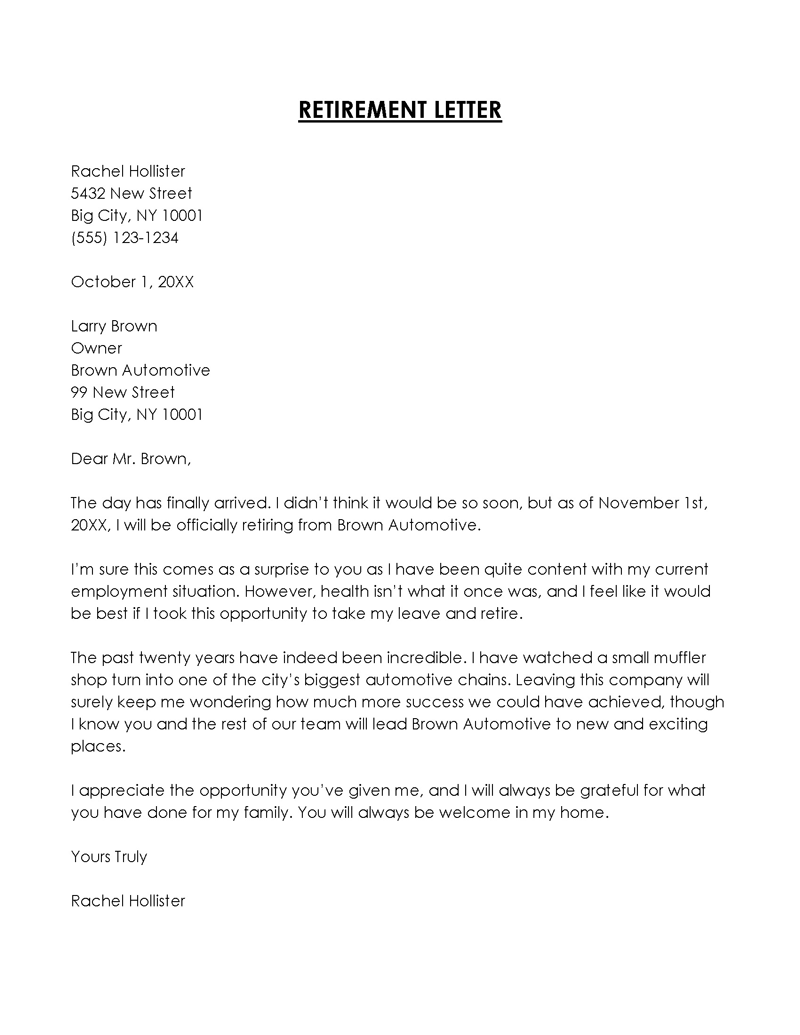
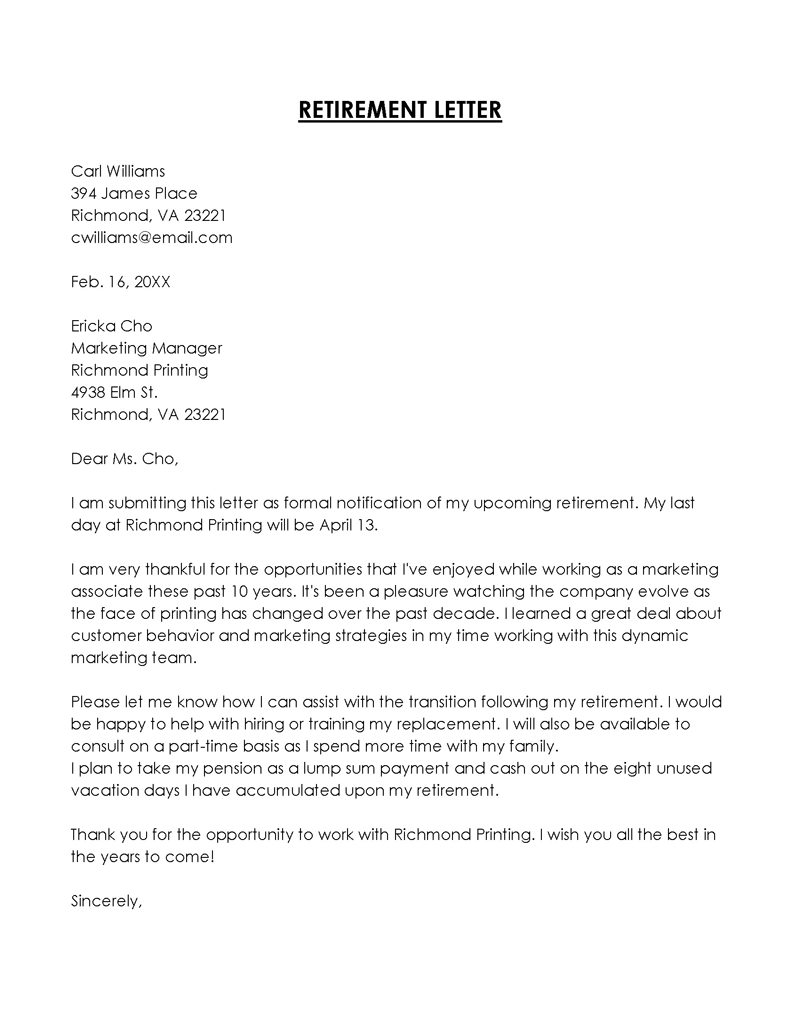
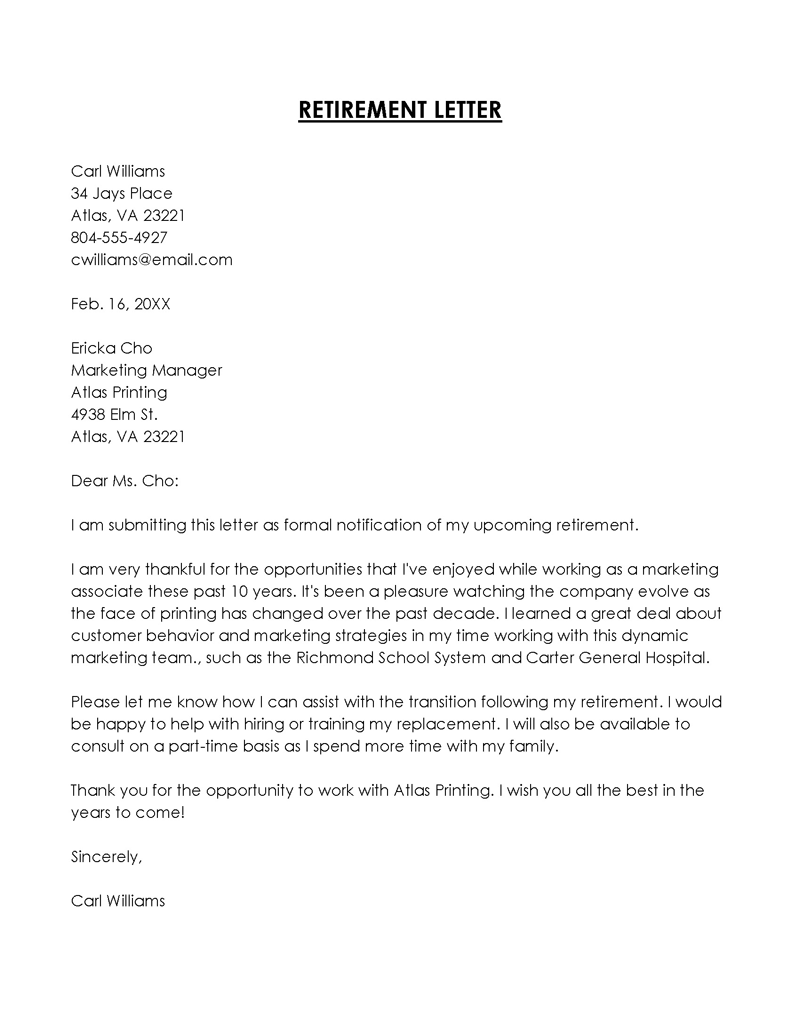
Why Do You Need a Retirement Letter?
There are different reasons you may want to consider writing this letter. While some choose not to do this, a retirement resignation letter can be a professional way to announce your retirement.
Some of the reasons you should write a retirement letter include:
To offer your thanks and appreciation
Whether you have held your current position for five or fifty years, the letter allows you to offer your thanks and appreciation for the work you were able to do at that company. In the letter, try to be gracious and express your appreciation for the experiences and work you were able to accomplish together.
Write about your experience at the company. It may seem impossible for any employee who has worked for a company long enough to fit their experiences into a few lines but try to briefly mention how important you felt your time there was.
Write about plans
Your letter can include a list of your plans now that you have finished working and are prepared to retire. Give the immediate supervisor some ideas about what you will do with the next chapter of your life. Write a few sentences describing each, whether it is spending more time with family, pursuing your hobbies, or traveling.
For official documentation
Your employer can officially record your retirement in your employee file by receiving a letter from you announcing your retirement. This document will go into the file at the same time to protect the employer. After retiring, some former workers attempt to file for unemployment in the hopes of obtaining additional funding to help them. The letter can be used as proof in case an employee tries to do this.
To promptly receive all company benefits
While the letter needs to go to your immediate supervisor officially, it is acceptable to copy it to the human resources department. This helps keep the HR department informed so that you can continue to receive all relevant benefits when you leave your position. This can include your health care coverage, 401k accounts, and pensions if necessary.
The specific benefits you will receive upon retirement, of course, will depend on the employment contracts, but the HR department can assist you with this.
Steps for Writing a Retirement Letter
The following steps should be followed to effectively write your letter:
Describe your intention
Following the formal greeting, you must state your intentions as well as the purpose of the retirement resignation letter. In this letter, you let the employer know that you plan to retire. You can list out the reasons you are ready to retire or just let them know in a few sentences that you are ready for the next chapter of your life.
Indicate retirement date
It is essential to include the date of your intended retirement. This makes it easier for your employer to find you if they need a refresher later. At a minimum, your retirement date should be at least two weeks from the time the manager receives the letter.
Remember
Many long-term employees will provide at least one month’s notice before retiring from the company.
If you are uncertain about what date is best to give notice, you can discuss this with your supervisor. They may request that you set up a meeting with them. During this time, you can discuss your retirement plans, set up the retirement date, and decide how to transfer your tasks to new team members.
If you work on large projects, consider giving the company a few months to hand over the project and train anyone who will take your place. You still need to draft and submit your letter despite this meeting.
Express appreciation for your experience
When you write the letter announcing your retirement, make it a point to express your gratitude to your employer for the opportunity to work with them. You have likely had a chance to enjoy many types of work, and now is the time for you to provide details on the projects and people who held deep meaning for you.
Offer to assist with the transition
Depending on your retirement plans, you may offer to help hire or train a replacement as needed to take over your role in the company. That may not be important for specific functions, but if you have a complex role, especially one that will have unfinished tasks, it may help if you can aid in the transition process.
Because you are most familiar with the project, you can recommend someone to be your replacement or assist in allocating different projects to those who are most familiar with the work and can do a good job.
Discuss the option of consulting
When you retire, you can choose to stop working altogether. However, some people find that ceasing work can be challenging, and they would rather taper off their work or choose their hours. In this case, you could choose to work as an independent consultant on an as-needed basis.
If this is something you are willing to do for your employer after you retire, let the employer know in your letter. This can give them the option to contact you if something comes up with the project or if they need assistance with some extra work.
Detail your needs regarding retirement
To end the letter, you will need to specify all the benefits you plan to receive in retirement. List out what you need them to do for your healthcare, retirement, and pension benefits once you retire. You can mention any of your unused sick or vacation days and how you would like to receive compensation for them when you leave.
While human resources can often check this for you, it is still a good idea to list it out to be on the safe side. Finally, if you do not have direct deposit, specify how you want to receive your last paycheck.
Related: How to Plan a Retirement Budget (Free Worksheets)
Template Retirement Letters
You can use the template below to write your letter:
Template 01
[Your name]
[Your address]
[Your phone number]
[Your email address]
[Date]
[Supervisor’s name]
[Supervisor’s title]
[Company name]
[Company address]
[Company address]
Dear [Supervisor]:
I am writing to provide notification of my upcoming retirement. My intended last day at [Company] will be on [date].
I am grateful for the chance to spend the last few years working with you. I believe that working for your company allowed me to learn a great deal and that my skills grew significantly during my time with you. I particularly enjoyed being a part of the [project] and working with [clients].
During the remainder of my time here, I look forward to helping make the transition as smooth as possible. I am happy to assist in hiring or training my replacement. I am also willing to assist as a consultant after my retirement to help make this transition smoother, should the need arise.
I would like to discuss my unpaid vacation and time off, along with my other retirement benefits, with HR before my retirement day as well.
Thank you for all of the wonderful opportunities you have given me over the years. I truly enjoyed the experience. I wish you all the best in the years to come.
Sincerely,
[Your name]
[Date]
Template 02
Name
Address
Date
Supervisor Name and Title
Company Name
Company Address
Dear Supervisor:
This letter is intended to inform you of my retirement. My last day of employment before entering into retirement will be on [date]. I have enjoyed my XX years with the company and appreciate the countless opportunities you have given me to help our clients.
I am aware that the company will need some time to find and train my replacement to adequately prepare them to take over my current responsibilities as I get ready to retire. I am willing to make myself available through the next few months to help with this transition if you feel it will be beneficial.
Thank you again for the chance to learn and grow with your incredible team and this company. I am looking forward to discussing my benefits package with HR and getting the chance to make this transition as smooth as possible.
Sincerely,
Signature
Sample Letters
This section provides two distinct retirement notice letter sample letters, carefully crafted to guide you through the process of expressing your retirement intentions clearly and professionally.
Sample 01
Dear Mr. Clarkson,
Subject: Retirement Notice
I am writing to formally announce my retirement from Innovative Solutions Inc., effective February 10, 20XX. This decision has been made with a mix of joy and nostalgia as I embark on a new chapter in my life.
It has been an honor to work at Innovative Solutions Inc. since my start date on April 3, 19XX. The opportunities for professional growth and personal development that I have encountered here have profoundly shaped my career. The support and camaraderie from my team and mentors have been invaluable.
To ensure a smooth transition, I am committed to completing all my current projects and will assist in the process of recruiting and training my successor. If there are any specific ways I can aid in this period, please feel free to let me know. Additionally, I would appreciate the opportunity to discuss the details of my retirement benefits and any outstanding payments at your earliest convenience.
Thank you for the privilege of being part of the Innovative Solutions family. The memories and skills I have acquired during my tenure will always hold a special place in my heart, and I look forward to keeping in touch with the team.
Yours sincerely,
Laura Smith
Sample 02
Dear Ms. Green,
I hope this letter finds you well. Today, I share with you a bittersweet announcement: after 25 beautiful years at Bright Horizons Consulting, I have decided to retire, effective March 15, 20XX.
Looking back on my first day, March 20, 19XX, I could never have imagined the incredible journey that lay ahead. The friendships forged, challenges conquered, and personal growth achieved during my time here are memories I will cherish forever.
As I transition into this exciting new chapter, I want to express my heartfelt gratitude for your unwavering support and inspirational leadership. The lessons learned and the bonds formed at Bright Horizons have been fundamental to my career’s success.
In the coming weeks, my focus will be on ensuring a smooth and efficient transition. I am prepared to assist in any way necessary, from training my replacement to finalizing ongoing projects. Also, I would like to arrange a meeting to discuss the specifics of my retirement benefits and any final settlements.
Though I am retiring from my position, the spirit of Bright Horizons and the connections I’ve made will remain with me always. While I look forward to what the future holds, the daily interactions with our team will surely be missed.
Thank you for everything. Let’s stay in touch!
Warm regards,
Emily Johnson
Key Takeaways
These retirement letters serve as useful guides for anyone looking to write their own retirement notice, offering a blend of professionalism and personal sentiment:
- Both letters maintain a professional tone while clearly stating the intent to retire and the effective date, ensuring clarity in communication.
- Expressions of gratitude and reflection are present, acknowledging the impact of the organization and colleagues on the individual’s career.
- The mention of tenure and achievements provides context for the decision, making the announcement more meaningful to the reader.
- Offers to assist in the transition, such as completing projects or training successors, show responsibility and consideration for the company’s operations.
- A positive and forward-looking tone is used, which can be reassuring to colleagues and supervisors and help maintain good relationships post-departure.
- Personal touches and a desire to keep in touch are included, indicating a sustained connection beyond professional roles.
- Clear structure and format make the letters easy to read and understand, which is important for any formal communication.
- The addition of a request to discuss retirement benefits and settlements is practical and ensures that important post-retirement matters are addressed.
Six Best Practices
As you work on your letter, there are a few tips that you can follow to write the best letter possible.
Some of the best practices you can use when writing this letter include:
1. Keep a firm tone
When writing your letter, you will need to have a commanding and firm tone while also being respectful. Depending on your situation, it is possible that the employer will not want you to go and may try to persuade you to stay.
Once you are sure that it is time to retire, a firm tone will let the employer know that you are serious and do not want to stay. You do not need to be harsh, but having a strong tone can help.
2. Be concise
Your resignation letter does not need to be ten pages long. This will take you too long, and your boss does not want to read all of that. Ideally, letters should be confined to one page. The sample letters shared above were also one page and still had enough room to hold all the needed information.
Express your gratitude and the date you intend to retire before offering your services as a consultant or discussing the benefits package. end with a gracious closing. For most retirement letters, three to four paragraphs will be sufficient.
3. Choose the best delivery method
Make sure you choose the right delivery method for your retirement resignation letter. Your employer may have rules about the way they wish to receive this letter. If this is the case, you should follow those steps. In most cases, it is best to submit the information electronically to have a record that it was sent and received.
4. Send a copy to Human Resources
When sending your letter, you will need to send a copy to the human resources department. This informs the appropriate team that you intend to retire and will need to use your remaining employee benefits. This allows them to contact you to discuss your benefits and how you intend to use them now that you are planning to retire.
5. Proofread
Take a few moments to proofread the sample letter before sending it out. You do not want to forget how to spell the manager’s name or have another grammar mistake within the letter. This should be a professional letter that expresses your gratitude and informs the company that you intend to retire. You can use online tools to help you proofread or ask someone else to take a look at the letter to help out.
6. Consult a sample or use a template
Writing the letter can seem awkward and hard to learn. You will most likely only write once in your life as you prepare to enter your golden years and enjoy your retirement. If you are not sure where to begin or what to write about, using a sample letter or a pre-made template can be a great place to start.
Final Thoughts
As a professional, you owe it to your manager and boss to inform them of your intention to retire. It is courteous and professional to give them this notice so they can get ready and look for a replacement for you. Follow the guide given above to write your letter when you are ready to retire.





